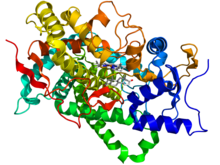| Aromatase deficiency | |
|---|---|
| Other names | Congenital estrogen deficiency[1] |
 | |
| AES results when the function of aromatase is impaired. The aromatase protein (pictured) is required for the biosynthesis of oestrogens like oestradiol in the human body. | |
| Specialty | Endocrinology |
| Complications | Virilisation, tall stature, primary amenorrhea, multicystic ovaries, |
| Usual onset | Adulthood |
| Duration | Lifetime |
| Types | Endocrine Disruptive Disorder |
| Causes | Genetic mutations of CYP19 |
| Diagnostic method | Extremely low level of oestrogen and elevated level of androgens |
| Treatment | Transdermal oestradiol replacement, hormone replacement therapy |
Aromatase deficiency is a rare condition characterized by extremely low levels or complete absence of the enzyme aromatase activity in the body.[2] It is an autosomal recessive disease resulting from various mutations of gene CYP19 (P450arom) which can lead to ambiguous genitalia and delayed puberty in females, continued linear growth into adulthood and osteoporosis in males and virilization in pregnant mothers. As of 2020[update], fewer than 15 cases have been identified in genetically male individuals[3] and at least 30 cases in genetically female individuals.[4]
- ^ RESERVED IU. "Orphanet: Aromatase deficiency". www.orpha.net. Retrieved 14 April 2019.
{{cite web}}: CS1 maint: numeric names: authors list (link) - ^ Morishima A, Grumbach MM, Simpson ER, Fisher C, Qin K (December 1995). "Aromatase deficiency in male and female siblings caused by a novel mutation and the physiological role of oestrogens". J. Clin. Endocrinol. Metab. 80 (12): 3689–98. doi:10.1210/jcem.80.12.8530621. PMID 8530621.
- ^ Lee JH, Lee NC, Tung YC (2020). "SUN-033 A Rare Case: Bone Pain and Continued Linear Growth in a Young Adult Male Due to Aromatase Deficiency". Journal of the Endocrine Society. 4 (Supplement_1): SUN-033. doi:10.1210/jendso/bvaa046.212. PMC 7209073.
- ^ Fan L, Zhang B, Li L, Gong C (2020). "Aromatase deficiency: A case series of 46, XX Chinese children and a systematic review of the literature". Clinical Endocrinology. 93 (6): 687–695. doi:10.1111/cen.14277. PMID 32623730. S2CID 220369250.